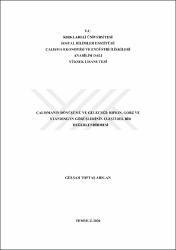| dc.contributor.advisor | Gümüş, İskender | |
| dc.contributor.author | Toptaş, Gülşah | |
| dc.date.accessioned | 2021-12-11T19:41:40Z | |
| dc.date.available | 2021-12-11T19:41:40Z | |
| dc.date.issued | 2020 | |
| dc.identifier.uri | https://tez.yok.gov.tr/UlusalTezMerkezi/TezGoster?key=fl0Kw4p1rmMDotyKRdYv1BcjeA3seqMVbMdOTBNpgU-T8BtNruhyvYtmjBWAXXf1 | |
| dc.identifier.uri | https://hdl.handle.net/20.500.11857/1507 | |
| dc.description | YÖK Tez: 641927 | |
| dc.description.abstract | Çalışma kavramı tarih boyunca var olmuş ve gelecekte de var olması beklenen bir kavramdır. Bu kavram, dünden bugüne ekonomik gelişmelere paralel olarak toplumların norm ve değerleri tarafından belirlenmektedir. Çalışma kavramı, üretim alanındaki gelişmeler sonucunda dönüşüme uğramaktadır. Bu dönüşümlerin en çarpıcı olanı 18. yüzyılın son çeyreğinde ortaya çıkan James Watt'ın buhar makinesini icat etmesi ile meydana gelen endüstri süreci olmuştur. Bu durumu takip eden seri üretim ve otomasyon süreçlerinin gerçekleştiği sanayi ötesi toplumlarda farklı boyutlara sahip çalışma hayatı ve modelleri ortaya çıkmıştır. İlkel toplum ile başlayıp sanayi ötesi topluma doğru yaşanan bu dönüşüm üretim sistemlerini de değişime uğramış ve bunun neticesi olarak ortaya yeni sektörler ve işçi tipi ortaya çıkmıştır. Bu tez; ilkel toplumdan sanayi ötesi toplumuna dek tüm aşamalara değinerek Rifkin, Standing ve Gorz gibi üç farklı sanayi ötesi toplum teorisyenlerinin çalışmanın geleceğine dair yorumlarını eleştirel olarak incelemekte, bu yazarların yeni toplum modeli oluşmasında geleceğe yönelik tahminlerde bulunarak realist bir yaklaşım sergilediklerini ileri sürmektedir. | |
| dc.description.abstract | The concept of work has existed throughout history and is expected to exist in the future. This concept is determined by the norms and values of societies in parallel with the economic developments from yesterday to today. The concept of work is transformed by relationships in the production sense. The most striking of these transformations is the 18th century. It was the industrial process that occurred when James Watt, who appeared in the last quarter of the century, found the steam machine. Following this situation, working life and models of different dimensions have emerged in the transindustrial society where the serial production and automation processes that follow. In this transformation process, which began with the primitive society and took place towards the trans-industrial society, production systems have also changed and as a result of this, a new type of sector and workers have emerged. This thesis; by addressing all stages from primitive society to today's trans-industrial society, three different trans-industrial society theorists such as Rifkin, Standing and Gorz critically examine their interpretations of the future of the study, suggesting that the authors mentioned take a realist approach by making predictions that should be for the future in the formation of a new society model. | |
| dc.language.iso | tur | |
| dc.publisher | Kırklareli Üniversitesi | |
| dc.rights | info:eu-repo/semantics/openAccess | |
| dc.subject | Çalışma Ekonomisi ve Endüstri İlişkileri | |
| dc.subject | Labour Economics and Industrial Relations | |
| dc.subject | Dönüşüm | |
| dc.subject | Transformation | |
| dc.subject | Endüstri devrimi | |
| dc.subject | Industrial revolution | |
| dc.subject | Gorz, Andre | |
| dc.subject | Gorz, Andre | |
| dc.subject | Rifkin, Jeremy | |
| dc.subject | Rifkin, Jeremy | |
| dc.subject | Standing, Guy | |
| dc.subject | Standing, Guy | |
| dc.subject | Çalışma | |
| dc.subject | Work | |
| dc.subject | Çalışma Tarihi | |
| dc.subject | Rifkin | |
| dc.subject | Standing | |
| dc.subject | Gorz | |
| dc.subject | Sanayi Devrimi | |
| dc.subject | Work History | |
| dc.subject | Rifkin | |
| dc.subject | Standing | |
| dc.subject | Gorz | |
| dc.subject | Industry Revolution | |
| dc.title | Çalışmanın dönüşümü ve geleceği: Rifkin, Gorz ve Standing'in görüşlerinin eleştirel bir değerlendirmesi | |
| dc.title.alternative | The transformation and the future of work: A critical evaluation ideas of Rifkin, Gorz and Standing | |
| dc.type | masterThesis | |
| dc.department | Enstitüler, Sosyal Bilimler Enstitüsü, Çalışma Ekonomisi ve Endüstri İlişkileri Ana Bilim Dalı | |
| dc.identifier.startpage | 1 | |
| dc.identifier.endpage | 130 | |
| dc.relation.publicationcategory | Tez | |
| dc.institutionauthor | Toptaş, Gülşah | |



















